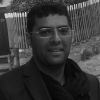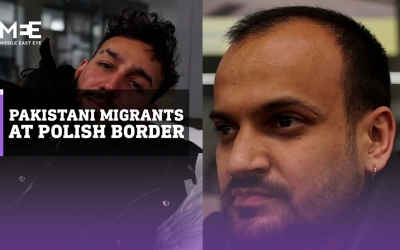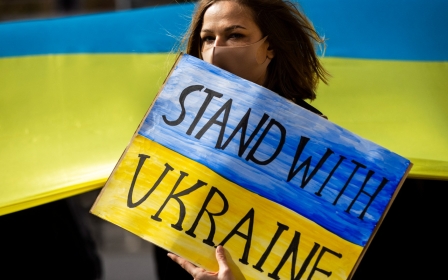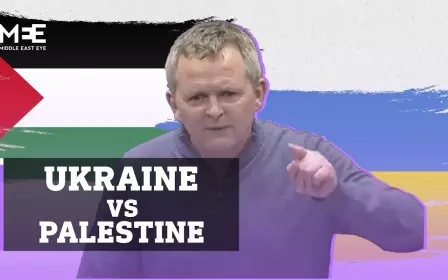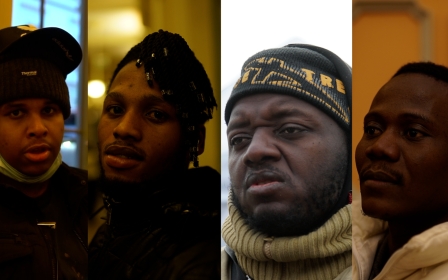Russia-Ukraine war: The limits of human solidarity
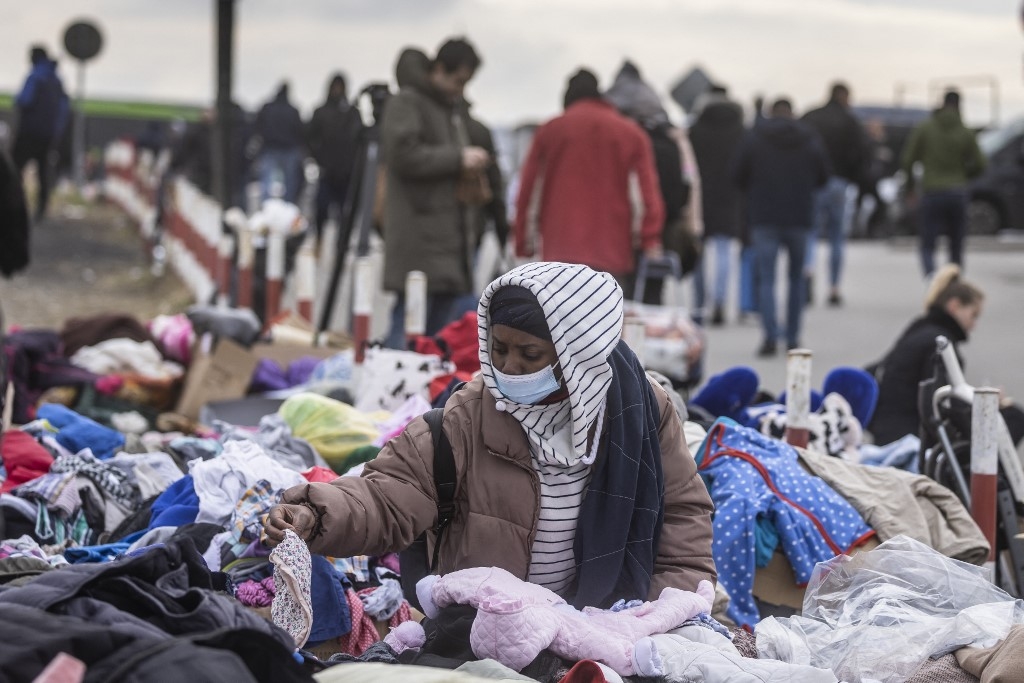
African, South Asian, and Arab populations have typically been victims of the wars waged or funded by Western powers against Africa, Asia, and the Arab world. The recent events in Ukraine show how these darker skinned populations have also become among the primary victims of wars that unfold away from their lands.
The racist commentary by various mainstream media outlets served to remind global audiences that the people of Iraq, Syria, and Afghanistan - and other non-European populations - are the usual victims of such conflicts (one of these racist commentators had the audacity to make these comments on Al Jazeera English, as if expecting their Arab colleagues and audiences to quietly accept their inferior place in this humanitarian hierarchy).
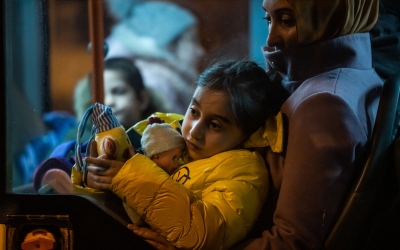
New MEE newsletter: Jerusalem Dispatch
Sign up to get the latest insights and analysis on Israel-Palestine, alongside Turkey Unpacked and other MEE newsletters
The solidarity and sympathy that emerge from such rhetoric are pre-conditioned on the exclusion of darker, non-European populations from this field of solidarity, sympathy, and humanity.
The issue is not merely rhetorical. Africans, Asians, and Arabs attempting to flee the Ukrainian war suffered discrimination and violence at the hands of the local authorities, were asked to wait until Ukrainians were evacuated first, were left stranded on the Polish border and were forced to stand in racially segregated queues at crossing points.
The privilege of the white Ukrainian refugee was always extended at the expense of her darker other.
Though shocking, such an exclusionary humanity and discriminatory policies are hardly new. They hark back to European humanism, which came on the heels of the Renaissance and sought to place the "human" - understood as the white European, usually male, human - at the centre of existence.
By the 19th century, the ideology of evolution - biological and social - provided the modern scientific seal to this schematisation (in its proposition that the European adult male presents the zenith of evolution). But the exclusion of certain human forms to the margins or the lower rungs of this emerging humanity was there from the start.
Civilised and barbarians
It was present in humanism’s appropriation of ancient Greek thought, where the world was divided into the civilised (Greeks) and barbarians. It was also present in the Aristotelian notion - which became central to humanism - that there are born masters and born slaves, and that it is natural for the stronger, more rational and more civilised to dominate the weaker, irrational and barbarian.
This master-race humanism played out in the conquest of the Americas, when the Spanish conquistadors and Catholic preachers paused to ponder on whether indigenous people had a soul to be saved, or were at all human.
Human rights historically carried over this humanist hierarchy and asymmetry, and when the French Revolution announced the first “Declaration of the Rights of Man and of the Citizen,” these rights were practised as exclusive European rights.
Such rights, and such humanity, were denied to the people of the Caribbean, as the French First Republic, putatively carrying the banner of liberty, equality, fraternity (or death) intervened to crush the Haitian uprising and restore slavery.
Colonialism is clearly an extension of this legacy, and so is the notion of “humanitarian intervention”, which gives superpowers the right to determine which populations are to be selected as humans worthy of rights, what rights are to be allocated to them and what modes of epistemic and physical violence are to be deployed in the process.
We in the Arab world, along with the global media, were complicit with this selective and exclusionary humanism when we mistook the 2013 “Euromaidan uprising” (in the aftermath of our own uprisings in 2011) as part of a worldwide wave of decentralised revolution.
These illusions served to obscure the pro-Nato, pro-US imperialism, anti-ethnic Russian, and anti-poor policies of the regime that was to be born out of this movement.
Glamorous protesters
Since Ukraine’s Orange Revolution of 2004 - which served as the blueprint for the other US-supported "colour revolutions" - global media sought to glamourise one type of protester - the kind that rises against a regime that is hostile to US interests - and the kind that demands anti-poor economic policies, coded as "market reforms" and "economic freedoms".
Uncritical solidarity - even in the presence of legitimate grievances against autocratic governments - with the image of the glamorous revolutionary then becomes the green pass for pro-imperialist military alliances and neoliberal “reforms”.
The trajectory of humanism from the European Renaissance until modern times has created a situation where human solidarity, pure and simple, is impossible
As one of the triggers of the Euromaidan protests was former President Viktor Yanukovych’s reluctance to sign off on complete integration in the face of European capital, the post-2014 regime went full throttle on this “integration”.
It inaugurated a set of austerity policies that undermined the already disintegrating public welfare system - whatever survived of it from the socialist days.
These anti-poor policies marched hand in hand with the pro-imperialist policies of a regime increasingly friendly to global capital, Nato, US imperialism, and the state of Israel.
They also marched hand in hand with policies hostile towards Ukraine’s ethnic Russians, which in turn triggered the secession of Donetsk and Luhansk (which is not to deny that Moscow is using these conditions for political and military leverage). Western media coverage covers up the neo-Nazi component that was active in the events of 2014 and continued to be active in the civil war in Eastern Ukraine as well as in the current war.
Regardless of whether the Orange Revolution and the Euromaidan uprising were the authentic expression of public grievance, or simply a US conspiracy, it is undeniable that the influence exerted by the US and by global media consecrated the glamorous, white revolutionary.
The point here is not to deny the revolutionary claims of white protesters, but to acknowledge how, under the present conditions of media bias and political meddling by superpowers, the glamorous white revolutionary always marches at the expense of his non-glamorous, dark other.
A new humanity
The trajectory of humanism from the European Renaissance until modern times has created a situation where human solidarity, pure and simple, is impossible. The wretched of the earth - not only in Africa, Asia, and the Arab world but also the economically and racially marginalised in Europe - are summoned to express solidarity in the name of a humanity that is predicated on their exclusion, not only on the level of its rhetoric and philosophic roots but also its economic and military policies.
Humanity becomes a zero-sum game: either the white Ukrainian refugee, or the brown; either the advent of Nato, or Russia’s war on Ukraine.
A third option is not only possible, but also urgently necessary: that of taking the bias out of humanity, creating humanity anew, so that sympathy, solidarity, and privilege are not necessarily extended at someone else’s expense.
We may - and must - recall here Frantz Fanon’s prophecy, towards the end of his paradigmatic anti-colonial treatise Black Skin, White Masks that from the turmoil and violence of the anti-colonial struggle the conditions will be created for the white and the black to march hand in hand.
“[A]nother solution is possible. It implies restructuring the world!” Fanon wrote.
While the battlefield for this struggle is clearly not Ukraine, that crisis highlights the anti-colonial struggle’s urgency, not only to redeem the humanity of the colonised, but to redeem humanity as such.
The views expressed in this article belong to the author and do not necessarily reflect the editorial policy of Middle East Eye.
Middle East Eye delivers independent and unrivalled coverage and analysis of the Middle East, North Africa and beyond. To learn more about republishing this content and the associated fees, please fill out this form. More about MEE can be found here.


